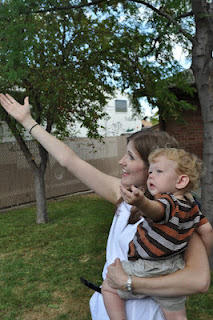 By the time I hit the ninth grade, for several years I had been mulling over what was (in my mind at least) a brilliant psychological thriller, born from my intense love of mysteries and horror stories in the ilk of Nancy Drew and Alfred Hitchcock. The protagonist of this thriller was actually a murderer but had a split personality and didn't know it. I spent months putting my thoughts into words as I wrote this story, prided myself that plot was really subtle but still engaging. I can't remember all the details now, but I do remember that a red handkerchief was the clue that ended up tying the story all together.
By the time I hit the ninth grade, for several years I had been mulling over what was (in my mind at least) a brilliant psychological thriller, born from my intense love of mysteries and horror stories in the ilk of Nancy Drew and Alfred Hitchcock. The protagonist of this thriller was actually a murderer but had a split personality and didn't know it. I spent months putting my thoughts into words as I wrote this story, prided myself that plot was really subtle but still engaging. I can't remember all the details now, but I do remember that a red handkerchief was the clue that ended up tying the story all together.Well, I remember Mrs. Brown, my ninth-grade English teacher, returning the story to me with a big A- written on the top, and all it said was something like, "So the protagonist is the killer?" I remember that she also gave our class a lecture on how this set of short stories was the darkest set of short stories she had read in her life, and she was worried for the future of America if the youth like us were so obsessed with madness and darkness.
From that time on, I pretty much gave up on creative writing. I stopped writing poems, limericks, short stories. When I took a creative writing class in high school, I felt like it was more of a chore than a method of self-expression. I don't mean to be a "teacher blamer" or anything, but teachers have a lot of authority in our lives, and for me, the fact that I got an A- on a story that took me years to conceptualize and months to write meant that I must not have been very good at creative writing.
I still do a whole lot of non-fiction writing, however. Mostly writing up the results of research for publication or grant applications, much as one is expected to do when you are an academic. Looking back on the situation now that I have been a teacher, I realize that teachers actually are not the ultimate authority. Since then, I have had people critique my writing in harsh and severe ways--saying much worse things to me than "You deserve an A-", but other people have deemed the same piece of writing good enough to publish in a top-tier journal. So I have come to realize that one person's opinion cannot constitute the absolute authority on my writing. However, I think I had to be at a certain point in my own personal emotional development to be able to take criticism without internalizing it too much as the product of my own personal failings. Still, though, I will say that any time I get an article rejection or a particularly discouraging review I still have to steel up my backbone and tap into reserves of emotional fortitude.
What this experience taught me is that teachers and their feedback can have huge consequences in the identity development of their students--they can foster identities as "good writers" or "bad writers," for example. I know that we, as teachers, may grade 200 assignments at any one time, and it's easy to become mechanical about how we respond to students without realizing that every one comment we give can make a real difference in their psyche. It's important for us to take our charge as teachers seriously, to wear the teaching mantle well, if you will. For the sake of our developing students.





